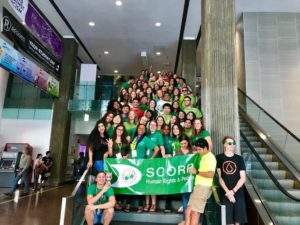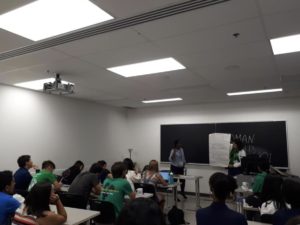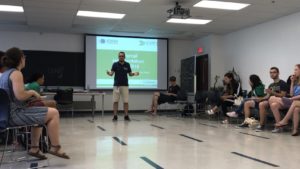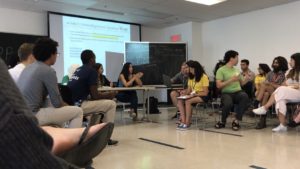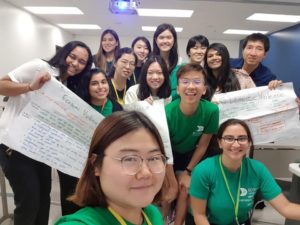
By Deviena Nabila – CIMSA UI
On the first day, all the delegates get to know each other, and the International Team introduce themselves and explain about what we’ll be doing for the next 5 days. After setting the ground rules, we move on to the SCORP sessions. There’s two option, Human Rights 101 and Human Trafficking. Since I didn’t know much about human rights, I joined the human rights 101 where I was given many essential information about human rights. The Session Team explain about what’s human rights, the current condition and what can we do about it. After that each person were given a post-it which contains a sentence describing one human right in daily life and then each person will go to the front of the classroom where they put up one big paper on the board, it was divided into three section based on the generation of human rights and then everyone who have the post-it should put it on the paper based on which generation we think it belongs to. First generation: civil and political rights. Second generation: social, economic, cultural rights. Third generation: rights of people
After that, we move on to the second agenda which is the small working group. We’re divided into four small groups with different topic, there’s one talking about SCORP strategic plan, one about SCORPions empowerment, one about SCORP involvement and visibility, and one about world peace day. I joined the one about world peace day where we brainstorm a plan and try to find the best way to commemorate the day. We focused on the form of the activity and the promotion of it.
On the second day, we have voting preparation, a session about impact of war and terrorism on global health à case study and a session from the IFMSA human rights external representation. During the impact of war and terrorism on global health, we were divided into 4 groups and given a case from countries that are under the circumstances and my group got Syria. We analyze the situation from the case given and we have to find out several points on the condition .
What were the ‘red flags’, that lead to the collapse of the health system?
- Which actions committed contradict the international humanitarian law (IHL)?
- In your own words: why does Malaria (polio) impose such a threat to the health of the Yemenis (Syrians)? Why does it pose a threat to global health?
- How did/ might this conflict influence the health of other countries?
- How can one improve the disaster preparedness of a health system to prevent its collapse?
The last agenda for the 2nd day SCORP session is about the SCORP Global External Focus or (GEFA) which focuses on 3 things: Refugees’ and Migrant’s Health and Rights, Humanitarian Action, Children’s Health and Rights. The external representation present the explanation about what IFMSA does outside of the board of IFMSA with other institution. We also talk about the importance of aligning the activities that are done by each NMOs or Locals with these focuses to match the goal. And then after that we’re divided into 3 groups to discuss deeper about each focus that has been mentioned before. We also have a video from one of UN agencies (UNRWA). For the focus discussion group I joined the one that’s about children’s health and rights and talked about the networking and link plan to external parties who works on this issue and how to build internal capacity regarding this issue.
On the third day, we have a presentation by IPCC representative (this organization won the Nobel prize). After that, we’re divided into 2 groups for debate, one who’s pro on nuclear utilization as a weapon and the other one is against it. I got the against group. We have a very short time to develop everything that we’ll say on the debate, the setting is a kind of simulation of a real formal diplomatic meeting which made it pretty fun because we have to make every word to represent our means of stating the obvious to not use nuclear as a weapon.
For the joint session, I went to SCORPxSCOPH session with the topic of ‘Public Health in Conflict Areas’. Here we were given an explanation about the health condition in emergency situation. We also play ‘pick a corner’, so there’s a case on the slide and then we got 4 options, each corner is assigned to each option, so after we read the case we have to go to which corner that match our opinion or what we’ll do about the situation. I really like this part because everyone (well.. not exactly everyone because the limited time) got to tell their reason or opinion why they choose this corner/option, it’s really fun to know different action that a person would take because of some different perspective.
For SCORP regional session the main topic is about gender-based violence. First, we discuss about what is GBV, what causes it and the outcome of GBV. After that, we’re divided into small groups (2-3 person) based on the forms of GBV and give examples of GBV cases that happened in our countries.
Day 5, SCORP fair!! First thing we have on the last SCORP session, this is where every NMOs got the chance to present their activity, everyone took their place around the room and set up their posters. Next we have another session for voting, this is where I represent the NORP from our NMO on taking the decision of agreeing upon some topic. What I learned from this, is how we have the voice to make a change for what really matters. After that we go into another session for small working group to finish up the work (there’s only 2 time allocated for the SWG). My group come up last, we present our plan for the World Peace Day. We tried to make an activity that everyone around the world could participate. We first came up with something like a campaign but it doesn’t really make a real impact, we want to make something that really contribute to making the world a peaceful place so we came up with a week challenge. It’s a list of small things that we can do such as smiling, greeting, helping small tasks, etc that we can do for a week. To make a promotion for it we also made a hashtag for this activity, piece4peace because it contains pieces of small things we can do to make a peace.
This is my first ever international meeting and I could say that it really changed me as a person, this opportunity gave me a reason to get involved in something bigger where everyone is working together to make a vision come true. This is also where I gain many new knowledges that I could not mention one by one but it truly gives me insight on what we (as a student) can do to create a better change. On the other hand, it also made me more aware about the condition of medical students role around the world, some have more access to giving contribution to the world but some are less fortunate. To sum it up, it has been a life changing 5 days of my life as a medical student.
